#larvik
Explore tagged Tumblr posts
Text

Tankbridge
40 notes
·
View notes
Text

Street scene in Larvik, Norway
Norwegian vintage postcard
#larvik#carte postale#ephemera#photo#historic#postcard#scene#norway#tarjeta#postal#street#norwegian#briefkaart#ansichtskarte#photography#vintage#postkaart#postkarte#old#sepia
22 notes
·
View notes
Photo

Larvik by Moonlight by Johan Christian Dahl (1839, Öl auf Leinwand)
#Johan Christian Dahl#landscape#moonlight#moon#larvik#oil painting#ships#ship#boats#village#night#night landscape#gloomy#moonshine#cloudy#art#artwork#painting#kunst#church
7 notes
·
View notes
Text

Larvik Harbor Vestfold, Norway Summer 2024 GFX 100 & GF 250mm F4 175mp two-plate panorama Edited in the style of Fujifilm Velvia 50 reversal film



6 notes
·
View notes
Text
youtube
Larvik, 1839
0 notes
Text
Auf und Ab in Telemark
Larvik nach Eidanger53 Kilometer, 604 HöhenmeterGefahren am 30. Mai 2024 Heute steht unsere erste richtige Bergpassage auf dem Nordseeküstenradweg an. Am Ende ist es aber gar nicht so schlimm, wie wir gedacht haben! Im ersten Teil des Tages geht es erst durch Larvik und dann über eher unattraktivere Küstenabschnitte. Alles ist dicht bebaut und die Aussichten auf das Meer sind rar. Bei…

View On WordPress
0 notes
Text

LAURVIG / LARVIK - NORWAY
0 notes
Link
Medicine by Larvik to Watch this new Video on Youtube and Enjoy it...
0 notes
Text
We Love The 90s & 2000s - Larvik - Larvik, Norway | 24 Nov, 2023.
Find out more / Get your Tickets here.
0 notes
Text
A Complete Encyclopedia of the Lore of Every Witcher School
This is a project I've been working on for a long time. The Witcher Schools in general have lore spread across 3 or 4 different sources, so it's very easy to find inaccurate details about each school due to a person only going off of one source without even knowing of the others. Hell, I've been guilty of this in the past. So I've gone out of my way to find every source available for the various Witcher Schools and compile it into one master post, mostly pulling from the standalone Gwent game, and the Witcher TRPG, as well as an email conversation I've had with the TRPG's writer, Cody Pondsmith. Without further ado, let's start out with the original school, the Order of Witchers.

Witcher schools are like the Clans of Skellige, subtly different, but largely united by their common ground, and that common ground is the Order of Witchers.
The Order of Witchers began as an experiment by the rogue mages Alzur and his mentor Cosimo Malaspina. They "recruited" tests subjects from orphanages, buying them from neglectful parents, or outright kidnapping street kids.
From Cosimo's Gwent Card:
"Children keep asking him for gifts. He doesn’t know why, but it really helps with finding subjects for his experiments."
The main goal of this project was to create an order of knights artificially mutated and imbued with extreme levels of magic to protect people from a world where, at the time, monsters were often literally around every corner.
The mutation experiments were grueling, and most early candidates died horribly, the girls especially, as the mutagenic compounds the mages were working with at the time were better suited for a boys physiology, and they quickly stopped trying to find a mixture that worked well with women, instead refining the more successful candidate pool to meet deadlines. Even with these refinements, however, the Witchers couldn't actually generate much in the way of magical power, at least not nearly as much as those funding the project had hoped for.
These early candidates were encouraged to stick to political neutrality, were told of their duty to protect the common people, and their sword instructor tried to encourage them to take on knightly virtues to live their lives by, though only a few candidates actually bought fully into these particular knightly ideals.
The school developed a training regimen that all later Witcher schools would put their own small twists on. They perfected the whirling sword style, practiced on the Pendulum and Gauntlet training courses. They learned the Witcher Sign magic, created by Cosimo. They were taught hunting and monster lore from experts hired from across the world, and master alchemists crafted the famous Witcher potions.
Ultimately, funding from this school would be pulled due to the Witcher candidates lack of truly powerful magic ability, and the order would start to fracture. Witchers dissatisfied with their lot in life after being forcibly mutated, and railing against the Order's enforced ideals began getting combatative with other Witchers over petty contracts. At this time, contracts were so plentiful that there was no real need to fight over them, but these dissident Witchers did so anyway out of a desire for autonomy and to be free of the Order's code, which they saw as having no practical purpose to prepare new Witchers for the road ahead, and hypocritical as it was forced on them by the mages who never cared for the Witcher's lives. This culminated in one such outspoken Witcher, Arnaghad, attacking another Witcher who poached a contract from him.
After being forced into the painful life of a Witcher, Arnaghad loathed anyone who imposed their will upon him, the Order and it's codes especially. He led an attack on the Order proper, aided by fellow Witchers who respected his defiance towards authority. Once they were beaten back, these dissidents fled to the Amell mountain range to start the next Witcher school, the School of the Bear.
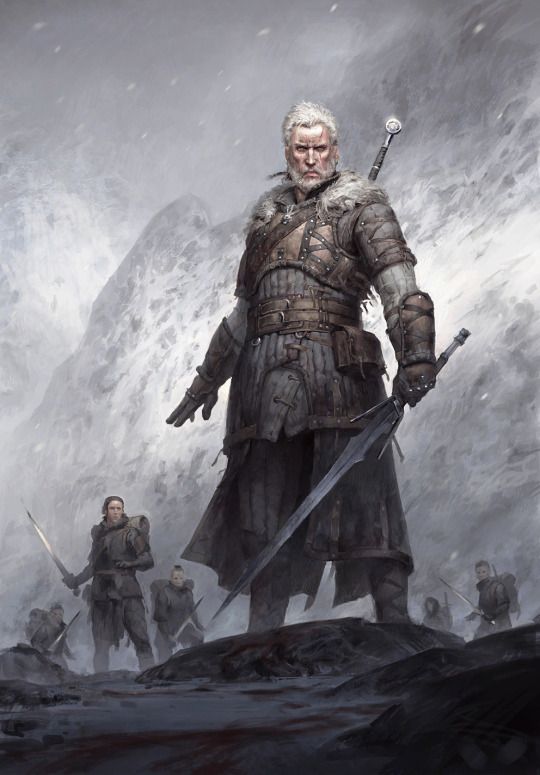
The School of the Bear is one of the most misunderstood schools of them all, owing to the first major lore drop about them being largely in-universe rumors and conjecture surrounding the school, and as such I may need to go more in depth. The two major misconceptions stemming from this is the rumor about their armor, which claims that they don't bother dodging like the other Witchers and instead take blows head on (generally a bad idea, according to Geralt in the books), and the rumor about them attacking most Witchers they meet.
I contacted Cody Pondsmith, who wrote a great deal of this lore, and he mentioned that Bears do often threaten or even fight other Witchers, but in a very Skellige way, only to ward off the other Witcher from contracts they want. The Bears just want to live lives where they aren't commanded by others, and were trained especially brutally, and so will fight for what contracts they want. However they will NEVER kill another Witcher, just draw first blood (outside of duels to decide who runs the school, which occasionally turn deadly. It's unknown if Arnaghad has ever lost these duels) and if that other Witcher stands up to the Bear, they'll let them have the contract and if they meet up and work together enough even maybe become a lifelong friend.
To quote Cody himself: "I like to think of the Witcher Order as a big family in which the Bear School is the blunt, no-nonsense brother. He can be prickly and a bit of a bully sometimes but he takes his job seriously and he can be a good drinking buddy if you get to know him. Not the friendliest of people but far from evil. If you stand up to him and show him you're not afraid of him, he'll respect you."
The other rumor is also an exaggeration. The Witcher TRPG mentions that the Bear armor was designed with flexibility in mind, and while they trained to take on weaker blows with their armor and "mastery of the Quen sign", they also trained how to move quickly in their armor if they needed to dodge a fatal blow. The Bears also still trained on the gauntlet and pendulum like the other schools. Cody Pondsmith also confirmed that the Bears are just as agile as the other Witchers.
The Bears' core philosophy is almost very Lambert like, viewing Witcher's work not as a duty, or knightly virtue, but as difficult, brutal work. The only reason they stick to this work is to do a job where no one else commands them and they're left in peace. They focus only on the practical aspects of their profession, and as such discourage their students from working together in training, since Witchers work alone. As Arnaghad said, "We pass through life alone, better get used to it!" As a result, Bears are very isolated, preferring their own company to that of other Witchers, and were encouraged to value their autonomy and self care above all else. The Bears' approach to teaching was embodied as "let them better themselves through practical, dangerous trials. Survival of the fittest", embodied by final trial, that involved climbing to the top of Mt. Gorgon and back, and any who died from the cold were left "as a sobering reminder of the dangers of their trade". This resulted in the students of the school seeing things in a very callous, survival of the fittest way. Be as strong as you can, and let the perils of Witcher training and life pick off those who can't keep up. As a result, the Bears were by far the smallest Witcher school.
Despite this, the TRPG has a list of random early training events Witchers from all schools can have, and Bears could sometimes make friends amongst their fellow witchers in training just like members of every other school.
Once the new Bear students left their keep of Haern Caduch, most wouldn't return to winter there, unlike the other schools. They developed a reputation as being terrible to fight, and for being firebrands, often speaking very bluntly and quick to anger no matter who they spoke to, authority included. One such Witcher, named Gerd, was asked by a Duchess to help kill her father. He insulted her so badly he got a warrant for his death placed on him, though all the peasants he met spoke rather highly of him. As a result, Bears found it easiest to make friends amongst the similarly minded Dwarves and Gnomes of the Amell mountains, and people of the Skellige Isles. According to Cody Pondsmith, this is the main reason the Bears stayed together as a group at all. They valued autonomy above all else and so long as they functioned as a Witcher school, they were left alone and no rulers would try and command them. They also largely take their ideals of free will and apply it to others, never seeking to rule over others. They simply wish to live their lives free.
One of the original Witchers to side with Arnaghad, Ivar Evil-Eye, had extra mutations done to him by the Order of Witchers during his trial, allowing him to see into other worlds. In these visions he saw the Wild Hunt rampaging across them, conquering them. Ivar became obsessed with stopping them, and tried to kill Arnaghad to take command and lead the Bear school against the Hunt. This failed, so he and his supporters left to form the Viper School.
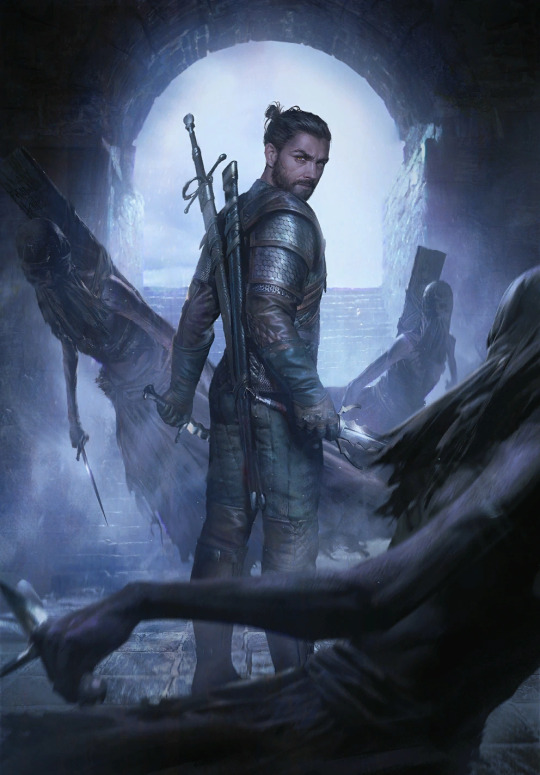
The Witchers of the Viper school, based in Gorthur Gvaed, were said to be the most secretive, taking contracts as both assassins and witchers. They at first dedicated themselves finding a way to stop the Wild Hunt, amassing a massive library on the subject. Fighting with an unpredictable, ambushed based variant of the Witcher fighting style, Viper Witchers employed poisons, brewed by skilled Viper alchemists, on both their swords, and a dagger in their offhand, their biggest deviation from typical Witcher combat techniques.
Vipers, for an unknown reason, eventually forgot their purpose. In his time, Letho of Gullet could only guess at why the school had been founded. Instead, they became famous for their skill at political killings, dealing with the nobility of the southern countries before Nilfgaard had even become a large-scale power.
Viper students had a different type of trial, after more grueling than typical training. Instead of any physical task like the other schools, the Viper students were given a pet at their induction to the school. And to graduate, they simply had to hunt it down and kill it, showing their lack of mercy.
While most of those who supported Ivar followed him to the Viper school, one group broke off and west east, across the Korath desert, to Zerikania, founding the School of the Manticore.
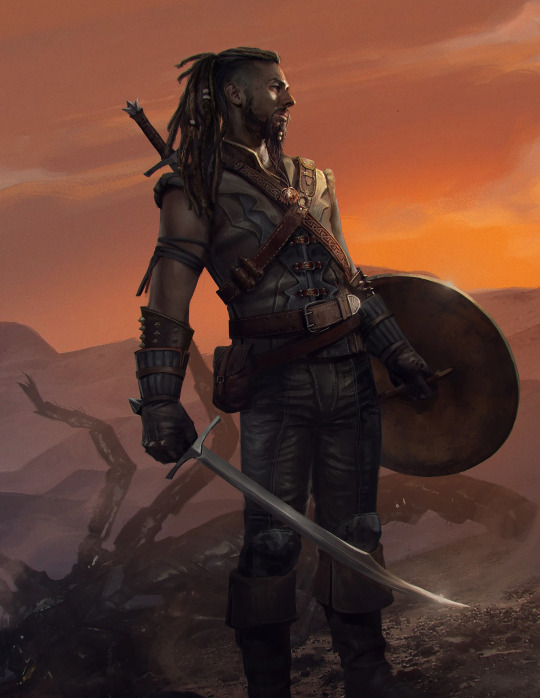
The School of the Manticore was founded by the Witcher Iwan, from the School of the Bear, following Ivar's assassination attempt on Arnaghad. They got work in the Korath desert as caravan guards, earning the attention of the Zerrikanian Queen after a deadly battle with a manticore. The Queen sponsored the Witchers of the Manticore, making them the only school to be officially backed by any government. They were experts on potions and anti-toxins, a necessity of dealing with the poisonous creatures of the Korath desert.
A unique adaptation to the monsters of the desert also had Manticore Witchers employ shields into the whirling combat of their Witcher training. Given their extra support, the Manticores held two keeps, Behelt Nar and Bailsuf Alsarea, on opposite sides of the desert, so that they might better patrol and guard those within it.
The Manticore is the final school to come from the schism Arnaghad had led. The other voices of dissent against the ideals of the Order would soon hear of these new schools and decide to break off as well to form the School of the Cat.
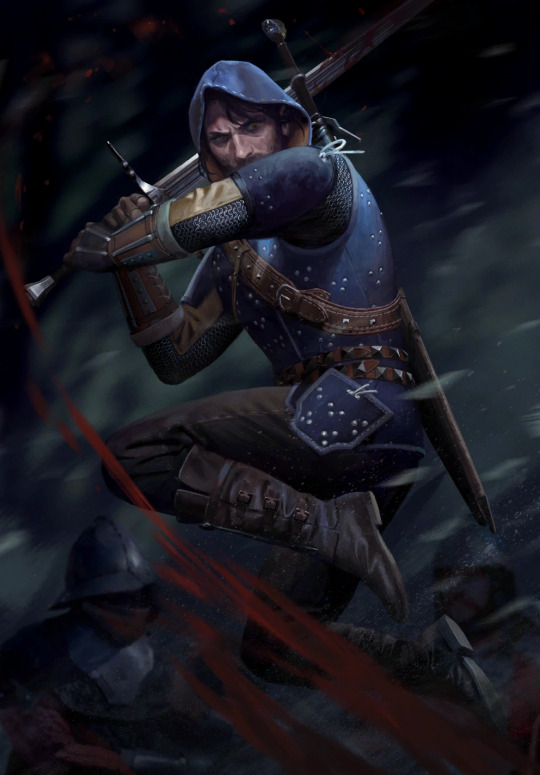
The School of the Cat was founded out of a response to the hatred and distrust Witchers received. They desired to be seen in a better, more respectful light. Ironically, they would end up doing the opposite. The Cat School stole away with several of the mutagens needed to make more Witchers and headed to Ebbing, and Stygga Citadel, where they would begin to experiment on human-elf children in an attempt to perfect the mutations. Its possible that the mages at this time furthered experiments on making women Witchers, but this is not confirmed yet.
Attempting to make a name for themselves, the Cats hired themselves out as spies, assassins, and mercenaries, genuinely earning them some respect from common folk for killing bandits.
In their attempts to perfect the mutations and further dull the emotions of their Witchers, the Cat school experimented harshly on a group of children that resulted in the opposite, giving these Witchers hightened emotional responses instead. These students, cast aside and left for dead, fled into the arms of a group of elves, who agreed to support them if this branch of the Cat School supported the elves' fight for freedom.
This branch, led by Gezras of Leyda, attached itself to the Dyn Marv caravan and traveled the continent, lending their services mostly to those nonhumans who could pay, while the main Cats at Stygga ended up getting assaulted by angry royals incited by their political maneuvering. This left the Dyn Marv branch as the only functional element of the School of the Cat. These Cats would train students' agility in a light, fast Elven take on Witcher fighting style, and would train their balance by making students walk a tightrope, starting low to the ground at first, but getting higher and higher each attempt.
The Cat school's breaking of Witcher neutrality and reputation for bloodlust earned Witchers such a bad name that those in the Order who most cherished their old swordmaster's knightly virtues would leave to form the School of the Griffin.
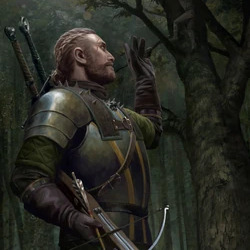
The School of the Griffin, led by Erland of Larvik, wished to truly achieve the dream of the original Order, and Gryphon, the Order's sword instructor. They traveled north to Kaer y Saren, an old fortress the Order once used, and cleansed it of the spirits of those who died in the first Witcher mutations. From there, they began a Witcher school focused on respectability and honor, believing in their knightly duties. And it worked, somewhat. The Griffins were sometimes advisors to nobility, and seen as honorable, but the prejudice against Witchers would never leave, and most would never see a Griffin Witcher as anything more than a monster playing at being a knight.
These Witchers tried their best to cushion their students against the pain of their lives on the Witcher's path, and were more brotherly than the other schools, though their knightly virtues and brotherhood were oftentimes cold comfort to Griffin students.
From the Witcher TRPG Sourcebook:
"Witcher I knew couldn’t really remember much ‘bout his past. Heh, too young to really form a lotta memories when they took him to Kaer Y Seren. Told me that the memory he did have made the mutations easier. Poor bastard clung to a memory of his pa takin’ him on a horse for a ride in the fields. Don’t know why he chose that one. Probably the only normal memory he had."
The Griffins amassed a huge library of magical knowledge, though they could only push sign magic so far, and the books were likely wasted being in a Witcher library. The library held several incredibly famous tomes on magic within, and was the envy of full mages across the Northern Realms. Despite all their efforts, they never could achieve their goal of bringing about the Order of Witcher's vision. The Griffins even had their own breaches of Witcher tradition in pursuit of their knightly heroics. An often said mantra of the Griffin school in Gwent is "To slay dragons! Tis our knightly duty!" despite dragons being largely innocent, intelligent beings who mostly wish to be left in peace.
Code Pondsmith had this to say about the Griffins:
"The Griffins stuck to the knightly traditions that the original witcher order tried to uphold. As a result it's safe to say that the Griffin school taught that monsters were the enemy of mankind and must be defeated. I don't think they would all be blindly overzealous but they wouldn't have any qualms about slaying sapient monsters if they believed it was for the good of mankind. Similarly, it's likely that they would side with humans in any conflict between monsters and humans. In a way, the Griffins' knightly virtues made them easier to manipulate than the other witcher schools. They were bound to protect humanity and thus were more likely to be convinced to hunt a monster if a local noble or alderman claimed it would be for the good of the people. This is the case with the dragons. The kingdoms and jewelers guilds of the North convinced the Griffin School that dragons were a blight upon humanity and the Griffins started slaying dragons regardless of whether all of the dragons they slew deserved it. Additionally, the knightly values might make Griffin school witchers more likely to take pity on desperate humans and work for free."
Those few Witchers remaining in the Order by now traveled to northern Kaedwyn, and started a school based on their tempered, traditionalist, and realistic view on the Order's goals. They based themselves in Kaer Morhen and dubbed themselves the School of the Wolf.
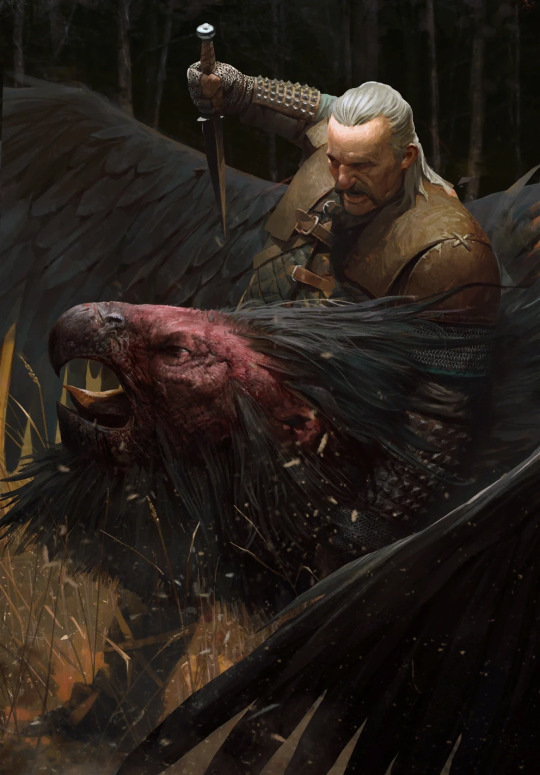
The School of the Wolf is the most famous Witcher school, known for their professionalism and efficiency. They don't kill humans like the Viper or Cat. Aren't bold or brash like the Bear, or put Knightly virtues above Witcher ideals like the Griffin. I mean, anyone reading far this knows who the Wolf Witchers are, so I'm not going to get into to much detail. They're Geralt's school. Ciri's school. While the Griffins school wasted it's energy on trying to be what Witchers were supposed to be, the Wolf set its goals on being the best they realistically could be.
They took a balanced approached to Witcher life and as such trained Witchers who were the best adjusted out of the schools, with neither the Bear's harshness nor the Griffin's egocentrism. They perfected the Witcher's style of combat, refining their swordsmanship into an incredibly graceful dance. Combined with their professional attitude and teachings that allowed Wolf Witchers to adapt very well to most situations thrown at them, Wolf Witchers were lauded all across the Continent.
With all Schools formed, the Golden Age of Witchers began, at first with the Bears and Griffins making peace. From Erland of Larvik's Journal (The TRPG's monster manual):
"Surprisingly enough the fracturing of the witcher order had lead to a more effective organization for us witchers. Spread across the Continent and each making more witchers independently, it was no longer the task of 60 or 70 witchers to patrol the entire Continent from Nilfgaard to Kovir. Each school patrolled their own path and when a Gryphon met with a Bear each knew they had their territory and any infighting wouldn’t be worth the bloodshed. We managed to broker peace and live as somewhat estranged brothers rather than bitter enemies"
Witchers at this time were seen largely as heroes, with their detractors' voices largely simmering underneath. With Witchers around to kill monsters, people felt safe and so ignored any misgivings they might have.
Witchers, no matter the school, aren't too dissimilar from each other, and so the Cintinent at large formed an overall opinion of the Witchers based on the traits they all shared. From the TRPG:
"In the heyday of witchers there were many many seperate schools, which all mutated new witchers and taught them the neccesary skills to hunt monsters and lift curses. While it’s generally agreed that there is a core set of skills required to a be a witcher, each school taught its students differently and focused on different aspects of witcher training. Thus, witchers from different schools often act differently and go about their jobs in similar but varied ways."
During this period, the Schools all would produce hundreds of Witchers (though at any given time, most schools had about 20 Witchers running the school, a handful of novices undergoing the trials, and around 30-50 Witchers on the path hunting monsters. This fluctuated from school to school. The Bear's brutal training resulted in the lowest number of Witchers amongst the schools, while the Wolves' prolific status and high success rates meant they took in more candidates and had more Witchers than the other schools), and each was their own person, With their own preferences and personality, despite the schools themselves having reputations for Witchers with only a few certain traits. For instance, the Bear Witcher Ivo of Belhaven fought like a Viper or Cat Witcher, but in personality was a perfect fit for the Bear School with how standoffish he could be. The schools kept to their own territory at first, but as time went on and contracts got ever more rare, these already thin lines fell apart and the schools stopped caring much about territories.
They also all customized their gear in different ways, usually keeping their gear in similar fashion to their school's, as its what they trained in an were used to. For example, Bear Witcher Junod of Belhaven wore what appears to be a set of Wolf School armor he had modified to fit Bear Witcher style.
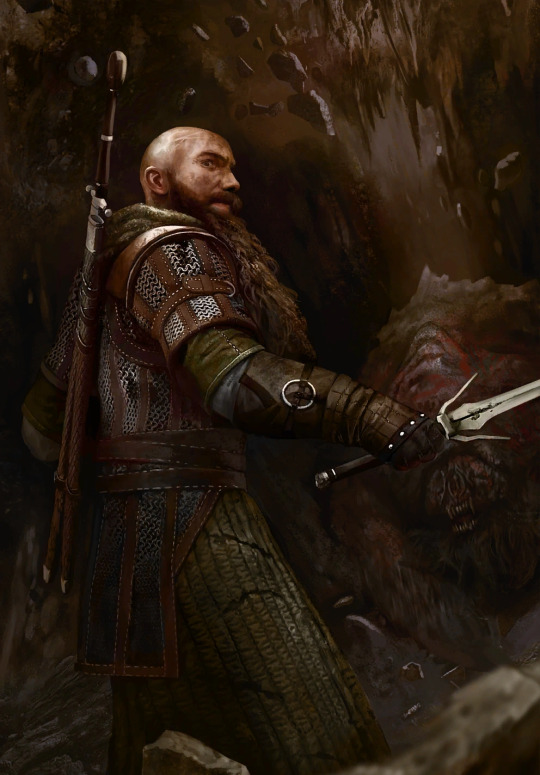
Witchers also at this time experimented with signs. The Griffins obviously focused on making them more powerful, and the Bears pushed Quen to a level beyond any other school. But the most interesting case is that of Warrit, a blind Viper Witcher who used the lesser known Suppire sign as a form of echolocation.

The Golden age lasted for around 150-200 years or so, ending around 1160 when the monster populations had been hunted down enough that people's main concern stopped being the monsters, and became the Witchers themselves.
The Griffin School, refusing to share the knowledge of its library, was destroyed by jealous mages. A group of peasants and mages attacked the Wolves' keep out of nowhere. The Bears failed to destroy a powerful cabal of vampires and, when peasants rioted and came for their keep, chose to disband rather than engage in needless slaughter. The Cat's keep of Stygga is destroyed, but the Dyn Marv chapter may still be alive and well. The Manticore School failed to protect an important prince from a fire elemental, and so lost their funding and closed. The Viper refused to support the Nilfgaardian usurper and were destroyed.
If you've made it this far, holy shit, thank you! I hope you have a great day!
#the witcher#Witcher schools#Witcher lore#as if anyone needed more proof I am a huge nerd#I hope this genuinely does help people though#School of the Cat#School of the Bear#School of the Wolf#School of the Griffin#School of the Viper#School of the Manticore#Wrote this because I have writer's block for my fic#geralt of rivia#lambert#eskel#vesemir#Ciri#arnaghad#Erland of Larvik#Ivar Evil-eye#Iwan#Gezras of Leyda#Witcher Role Playing Game#Witcher TRPG#the witcher 3#witcher 3#witcher games#Dragonfly Witcher
436 notes
·
View notes
Text
Cause I get sad sometimes about Arnaghad and Erland, then Arnaghad and Ivar, how the big bad Bear watched his boy sever ties and walk away from him, then how Gerd died trying to save his human lover, leaving his father and two remaining brothers all alone, the last of their kind. Sometimes I get sad about the Bears in general, so here.
#the witcher#school of the bear#the witcher 3#witcher arnaghad#erland of larvik#witcher gerd#Junod of Belhaven#Ivo of Belhaven#skellige#Torgeir the Red#arnaghad x Erland#school of the viper#Ivar Evil-Eye
4 notes
·
View notes
Note
I just wanted to say I adore your Arnaghad and Erland fics! I think it perfectly encapsulates their dynamic and that you also write beautifully. I especially adore 'When wishes were horses'.
I don't know of you have been asked this but what do you think of the Griffin school and their code? Do you think they kept following it after mages caused an avalanche and anti witcher sentiment started to rise?
Now, there IS a complicated question. I have at least 2 stories where the Griffins to not keep to their code after the fall of Kaer Seren. One is of course Song of the Dragon, where most of the Griffins get involved into founding the school of the Dragon, and thus go a different path. Another story that explores a possible change for them was "The End of the Griffins" exploring ideas for their school to change, though that story is a one-shot.
I think individual Griffins will have kept to the code they were raised by, especially in the face of adversity. Which makes for great individual stories.
One topic that fascinates me, but that I have yet to get around to find a good context for, would be Erland himself, the Griffin Grandmaster and oldest Witcher there is, to undergo such a change. Not in the "betrays his principles" kind of way, but more in a story where this changes comes more natural, or maybe even out of principle or conviction.
But and there is a big but for this idea in my head, and that is my other Erland headcanon. The RPG books say that he was Skelligan Born and grew up on one of their raiders, so he wasn't very chivalrous or principled as a kid. My headcanon says that Erland adopted Talisien's code of honour so strictly, was because this code is all that keeps Erland from becoming a much darker and dangerous man. Erland was consciously trying to be a better person, and that code helped guide for three centuries. Who would Erland be, if he dropped that code and his skelligan upbringing (and they are Proto-Vikings, no doubt about that) would re-assert itself? It's a question that endlessly fascinates me.
What do I think of the Griffins and their Code? Now, that question is a bit coloured by me being me. I have a thing for knights, knightly orders, their code, and people who uphold a code of honour, even if the world around them thinks them crazy for it. Hence I love the Griffins more than any other Witcher school.
4 notes
·
View notes
Note
So having found your blog from your post on the order of Witchers I wanted to ask, am i the only one who dislikes the "Witcher's Journal" book and how the various schools have been presented post Witcher 3 generally? Its far to unfavorable to the other schools in my opinion, Making Arnaghad and the bears out to be darwinists who think the "strongest should get the contract" for instance. Witcher contracts often employ just as much brains as brawn and as such it makes it seem like we're supposed to despise Arnaghad for being a brute and a fool. I understand that it is just Erland's pov, but Gwent seems to support this and overall it looks like we're supposed to think lesser of the other schools compared to the Griffin.
I’ll be honest, before this moment the “Witcher’s Journal” wasn’t something I had really devled into, or knew existed, which is why its been a hot moment cause I had to find and read it to answer. I think it has to do with perspective for a lot of it, as you’ve mentioned, as much of this is going to be written by either Erland’s point of view, or for the Gwent cards, the creators of those (unsaid in the books, said in the games) are the base perspective.
For the Witcher’s Journal, Erland I think starts off with trying to set the Griffin school above the others, that they were ‘more advanced’ in their technique and their moral high ground was something to strive for, but nevertheless they were still buried beneath a mountain of snow and ice; “The realms of humanity will twist these atrocities to their liking in their histories. I have no doubt witchers of all schools will soon be known as nothing more than monsters and devils… When the last witcher has fallen, and the monsters begin to creep from the crypts and caves of the world, humanity will begin to remember.” Erland is of the (correct, honestly) belief that the world will turn against his brothers, estranged though they may be, and still attempts to protect the future generations of humanity. Is this the right choice? Eh, who knows. Humanity sucks. But this is important to mention because this is basically the first page, every reader knows the downfall and end of the Griffin school, and how their grandmaster thought of it. A problem later into the book was when Rhys was cut by Arnaghad, neither of their perspectives are shown or written of, just that Arnaghad was someone who didn’t show kinship or feel kinship to the other Witchers and ‘when he learned that such a lucrative contract had slipped his grasp his blood *must have* boiled.’ Erland is making assumptions of what happened and passing them off as fact. And when Arnaghad returns to the keep its with a ‘possee of other brothers[,] no doubt he expected a fight’, which doesn’t scream ‘focus on the job aspect of being a witcher with no ties or inflated nonsense of the ego’, but more someone was wronged and he tried to gather backup for the slight given (a fic actually comes to mind in the opposite when Jaskier’s being threatened by a lord and Geralt gathers ‘a posse of other brothers’ to demand the lord back down… can’t remember the fic right now, damn, but its under the tag ‘witchersexual Jaskier’). I got off track, but anyway, Erland is the perspective we are given for this, and honestly we know more about Arnaghad than Rhys, so we know next to nothing except the ‘word of mouth’ of this event, which is definitely not the best for making decisions, taking the word of the first guy back to Morgraig. Arnaghad probably had a very different tale to tell when he returned, but wasn’t quick enough for it.
Moving on to Gwent as you mention… In the books, the Gwent game would be hard to explain having random characters central to the story (unlike in games when everything the player is seeing needs to be something they'd also understand and add to the experience), but having 'random' characters as archtypes would (you have your king cards, your ace cards, and whatnot, just filter that in with 'monster/northern/elf/south' cards), additionally Geralt, in Baptism of Fire, plays Barrel with the dwarves and noticed how card artwork was more decorative and detailed than human cards, lending more credence to drawven made card sets for Gwent, which would work well in the idea that dwarves 1)know Dandelion very well as a lore giver, 2)constantly reoccuring figures 3)putting their own spin on things. Should we go with this idea, the dwarven perspective then influences what the Gwent Cards are saying, and it does appear more popular (in the games) in nonhuman districts. To go for more of a perspective thing, I think I'll examine Adept/Mentor Cards because that shows training methods of the schools in the eyes of the designer.
Cat’s are depicted as ruthless, going for the coin no matter what, and their training card shows the boy blindfolded while balancing above the roofs, but what the Adept card doesn’t show is the Mentor below and watching. Now, would the mentor help if the boy slips? Who knows, the card does suggest it in my opinion but maybe that’s because I’ve read too many Cat Fics which flavour my view.
Vipers would be more ruthless in their depictions, similar to the Cats, and with their training cards, it has the Mentor with his back turned away from the adept in the background, but close enough to aid should something go very wrong in a moment. The adept is fighting the goat, and given Viper lore, this might actually be the boy’s pet he was given to raise, unclear, but given the anguish on his face, its a possibility. Which… might lend more credence to the ruthlessness if a mentor was made to watch that ‘trial’ so the pet couldn’t go free instead.
Griffin interestingly have the adept climbing a tree to retrieve an arrow while the mentor is at the ground watching. Not much to say about it, but it does emphasise 1, the nature aspect rather than being in a town (like the cats were), also 2, strength/brawn and intelligence. No one is climbing a tree without forethought, if you step on the wrong branch you fall, but unlike what Erland would have us believe, there isn’t anything in these depictions that have moral high ground.
Bear adepts are shown catching fish, which isn’t awful depending on where they’re fishing. Theoretically it could be trying to depict being somewhere cold so its not just ‘catch your dinner’ but also ‘endure the cold water’, meanwhile from what Google is telling me, the Mentor card is nowhere near the adept, unlike in the other ones where you get hints of them being nearby, instead they are with 5 other Witchers on a hunt for a Dire Bear covered already in spears/arrows. Now, while I say that, this isn’t easily explained as the adept ‘being forgotten’ but could be trusting the adept to not only catch enough food for the others, who will need it after fighting the Dire Bear, but also, what type of food would a Dire Bear like? Ah what any bear would theoretically like, fish.
[Note, The Wolf School Mentor is set up as Vesemir slaying what appears to be a Cockatrice, but the Adept is missing from Google, so the wolves are being ignored]
I think that overall, the Griffin school is set up to be the ones focused on knightly behaviour and courtesy and magic while the others were ignoring the need to get involved with that which inflates your ego. Geralt in particular would have made a great Griffin with his beliefs of knight-stuffs as a kid, but the wolves school… didn’t train it out of him because he certainly still has traits of it, it disuaded the belief and focused on getting the boys ready for the outer world and its harsh realities. Sure, ok, this is focusing on two different times, Erland vs Geralt, but the belief there would still hold. The Griffin school, tries to set up that they have a purpose and their brothers will support them as if the same can’t be said for the other schools, which in my perusing, there’s very little that would cause the Cats to not support one another, or the Wolf brothers… All in all, the schools are portrayed unfavourably against one another and in general. For most of the books one is focused on learning about Wolves and their existence, for Witchers Journal it’s all about Griffins and how they are better, and Gwent is a mixmash of just representation from as far as I can tell.
#the witcher#lore#character analysis#school of the bear#school of the griffin#gwent card game#erland of larvik#arnaghad
7 notes
·
View notes
Text
TOP TEN TUESDAY : 10 livres de ma PAL choisis au hasard
Le Top Ten Tuesday est un rendez-vous hebdomadaire dans lequel on liste notre top 10 selon le thème littéraire prédéfini. Ce rendez-vous a initialement été créé par The Broke and the Bookish et est repris en français sur le blog Frogzine. Inspirée par le TTT de Light and Smell, j’ai lancé, à mon tour, l’application dans laquelle je note tous les titres et auteurs qui ont attiré mon attention. Je…

View On WordPress
#Calmel#De nulle part#Discours#Dix ans noces de sang#Favan#Feeney#Fellowes#Fouchet#L&039;agence#L&039;assassin du train#La lettre de Noël#Le disparu de Larvik#Le Fabuleux Voyage du carnet des silences#Le templier de l&039;ombre#Les soeurs Mitford enquêtent#Lier Horst#Morgan#Moyes#Pooley#Sous le même toit#Toutes les histoires commencent par une petite faim
0 notes
Text
Wettlauf mit den Regen
Furustrand nach Larvik59 Kilometer, 621 HöhenmeterGefahren am 28. Mai 2024 Oh oh oh! Für heute Abend sind starke Regenfälle in der Region Larvik angesagt. Ab 17.00 Uhr soll es schütten! Wir wollen nach Möglichkeit unser Zelt noch im Trockenen aufbauen und stehen deshalb gleich auf, als wir um Viertel nach sechs aufwachen. Den Campingplatz haben wir zum Glück gestern schon bezahlt – Bis neun…

View On WordPress
#Bikepacking#Camping#Eurovelo 12#Larvik#Mountainbike#Nordseeküstenradweg#Norwegen#Oseberg Wikingerschiff#Radwandern#Sandefjord#Tonsberg
0 notes
